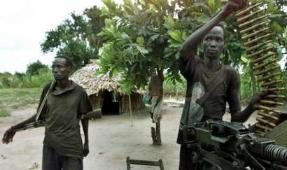War-weary and poverty-stricken, south Sudanese long for peace

By Bogonko Bosire
RUMBEK, Sudan, Oct 3 (AFP) — After 20 years of civil war, Rouk Mabel, an elderly farmer in the southern Sudanese town of Rumbek, would be happy to make do with a single meal a day as long as the fighting stops for good.
“I will never complain that I eat once a day, as long as I don’t hide in bunkers again and as long am not regarded as scum of the earth,” Mabel told AFP in Rumbek, a dusty outpost 900 kilometres (560 miles) south of Khartoum.
Like most people in the south, she was delighted about the transitional security agreement signed on September 4 in Kenya between the Khartoum government and the southern rebel movement, the Sudan People Liberation Army (SPLA).
Under the deal, both sides will intergrate some of their armies and the government will reduce the number of its force from southern positions when a final peace accord is signed to end a devastating war that has ravaged the country since 1983.
Speaking through an interpreter, Mabel, a placid woman who lost a son in the war, said the presence of government troops in the south was a source of constant fear.
“When I heard that the government had agreed to withdraw most of its army from our land, I considered it the most pleasant news ever,” said Mabel.
John Palwal, a 50-year-old retired SPLA fighter, also longs for peace.
“I have spent the better part of my adult life fighting for freedom. Most of us were born into poverty and brought up in squalid conditions. But that does not count, at least not for now,” he said.
“I may look frail as a result of insufficient nutrition, but all I need now is peace for the sake of posterity,” said Palwal.
In maize and sorghum fields around Rumbek, women rake up the ground with sticks in search of edible tubers, hoping that the progress made towards peace will give them a chance to harvest their crops and that bombs will not force them to abandon them as they mature.
Most people living near Rumbek, SPLA’s main garrison and an operations base for many humanitarian agencies, expressed cautious optimism that tranquility brought by the rebel take-over of the dusty town in 1997 will last.
“Since 1997, there has been peace here, everybody expects that it lasts,” said Mabor, a resident of the town. He said that many Rumbek residents can remeber at least one relative killed in the war.
“For sure the war has taken a toll on the workforce that used to till the land,” said, who insisited on using only his first name.
An aid worker, who who spoke on condition of anonymity, said the people of southern Sudan had become inured to suffering as a result of war, famine, disease and poverty. They bore their hardship with considerable stoicism, he added.
“These people usually complain of marginalisation by the northern government, but none says a word about deaths and suffering caused by war and famine, it’s a unique trait,” the aid worker pointed out.
“There are a few schools, but very few (people) can afford to pay to learn, ” he added.
UN aid agencies and other humanitarian organisations work out of Rumbek in a bid to alleviate the people’s many problems.
Rumbek has an airstrip, but most other infrastructure is non-existent.
Sudan’s civil war erupted in 1983 when the SPLA took up arms to end domination of the mainly Christian and animist south by the Muslim north. It has since killed more than 1.5 million people and displaced four million others.
Under an agreement reached last year, Khartoum and the rebels decided on a six-year transitional period for the south at the end of which the southern Sudanese would vote for unity with the north or secession.
Talks will continue on the last sticking points of power-sharing and oil resources, as well as disputed regions.
